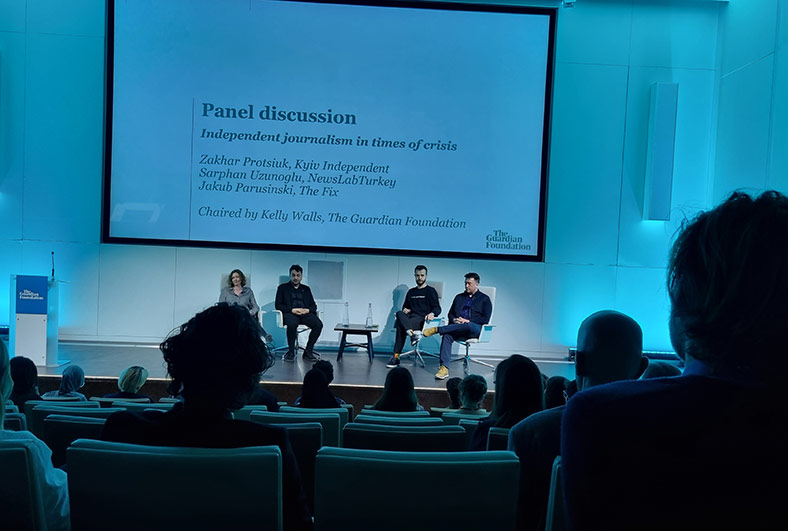Blog / Events / Journalists
Challenges and solutions for independent media and press freedom

Last week, World Press Freedom Day celebrated its 30th anniversary. Created by the United Nations, the aim of the day was both to recognise the good work being done to protect press freedom but also to highlight issues and where the media’s voice is being silenced.
Compared to many other countries globally, the UK ranks fairly well when it comes to press freedom and is 26th in the most recent RSF Press Freedom Index report. However, there has been a rise in disinformation in the last few years and new technology could impact media literacy.
The Guardian Foundation promotes press freedom and works closely with schools and news organisations to enhance news and media literacy, give opportunities to underrepresented voices and enable media viability. To celebrate World Press Freedom Day, the foundation held an event in London, with one of the panels focusing on independent journalism in times of crisis.
The Issues
While the RSF Press Freedom Index may make okay reading for the UK, it highlighted that 31 countries are in a very serious situation. This is up from 21 countries just two years ago. Kelly Walls, executive director of the Guardian Foundation, spoke of the importance of information to understand the world around us and to make informed decisions.
However, if audiences aren’t educated to critically evaluate sources and discern reliable information, then trust with the media can’t be built. This in turn means that news has no value, readers won’t pay for it and public access to fact-based journalism will decrease. Without this ability to make informed decisions, the means of holding power to account is weakened.
The panelists, Zakhar Protsiuk of the Kyiv Independent, Sarphan Uzunoglu of NewsLabTurkey and Jakub Parusinski of the Fix, have all witnessed this in their home countries and across parts of Central and Eastern Europe. Sarphan said that self-censorship had reached another level in Turkey after new press and social media laws, and it’s currently ranked 165 out of 180 countries in the RSF index. Zakhar spoke of how the Kyiv Independent was founded after the whole editorial team of the Kyiv Post was fired as the owner didn’t like them attacking his real estate business. While Jakub said the two main forces encroaching on press freedom are oligarchies and government, evidenced in his native Poland where the state oil and gas company took over the largest regional media holdings.
The Solutions
These blatant attacks on press freedom means that the media needs to counteract this and provide solutions to make sure news outlets retain their independence. At the NewsLabTurkey, Sarphan has launched the media incubator programme which has supported 96 projects so far to help give independent media and independent podcasts the chance to establish themselves. This means that people in Turkey know now that independent media outlets can get funding and fill a gap in the system through technological methods.
Zakhar said the key for the Kyiv Independent has been making its own money so it can remain truly independent. The team have managed to do this by being a reader funded organisation through a membership and donations programme. They currently have around 10,000 members who support them each month and have received donations from about 30,000 people. This community that has built up has enabled them to grow and hire more staff and can now look to create a long-term strategy for the outlet.
From Jakub’s perspective, the biggest impact can be felt through the sharing of knowledge and skills within the media. The industry is constantly changing and experimenting with new ways of producing content so it’s important these are relayed to other media outlets, especially ones that are independent. The Guardian Foundation did this with an independent media outlet in Russia, Holod Media, and helped them to use personalized newsletters which in turn has created additional revenue from readers.
The Future
All these solutions help to keep the press free and independent from government or outside influences. However, as the Index shows, things have been getting worse rather than better globally in the last few years, so there is work still to be done moving forward.
The importance of the media has also been highlighted in the last few years though and Zakhar believes that in times of crisis, people turn to the media to find out what is happening. This was the case with Covid and with the invasion of the Ukraine. Therefore, this needs to be built upon in the future to show that fact-based news is not just crucial in difficult times but also during relatively calm times.
It has also helped people to see that there are problems in the media and Jakub believes there is now a broad social recognition that things need to change. Unless we have a healthy media environment or healthy ecosystem then we won’t have healthy societies or a healthy democracy. This means that more resources and power will be put into this problem and making a change for the better.